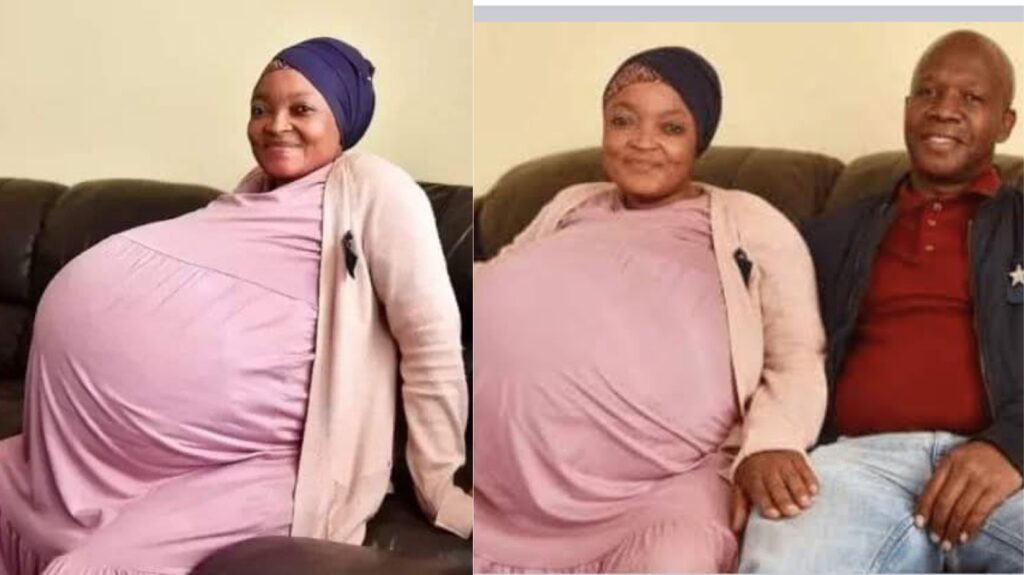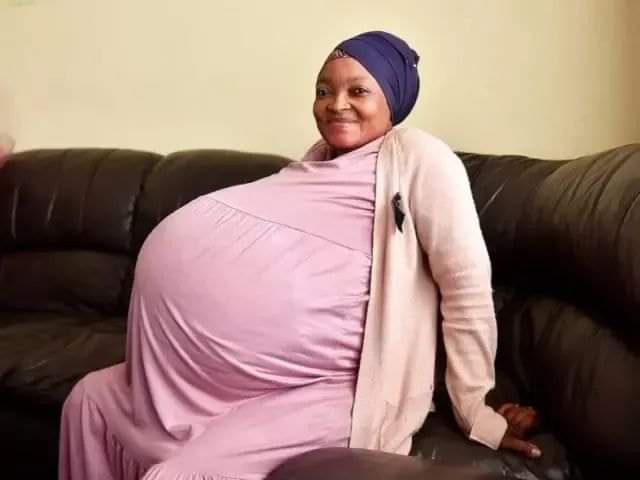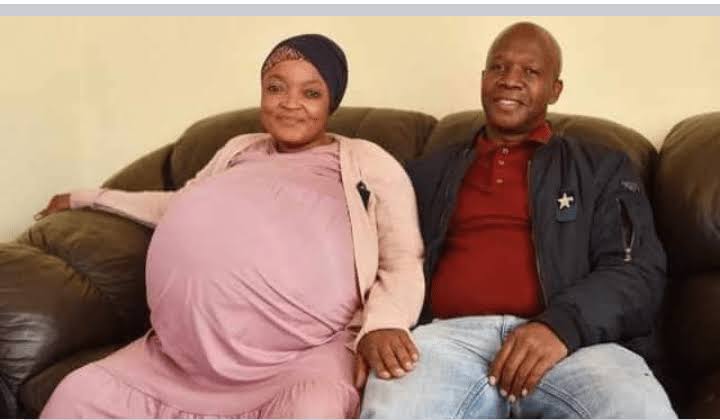A 37-year-old South African woman, Gosiame Thamara Sithole has given birth to 10 babies (7 boys and 3 girls).

– A Gauteng woman has given birth to 10 babies, breaking the Guinness World Record held by Malian Halima Cissé who gave birth to nine children in Morocco last month.
Gosiame Thamara Sithole, 37, gave birth to her decuplets – two more than doctors had earlier detected during the medical scans – at a hospital in Pretoria last night, said her husband Teboho Tsotetsi.
He said Sithole, who hails from Tembisa Township in Ekurhuleni, delivered her seven boys and three girls by Caesarean section.
Sithole, who has six-year-old twins, previously told the Pretoria News that her pregnancy was natural as she was not on fertility treatment.
Speaking to the Pretoria News last night, Tsotetsi said Sithole gave birth to their bundles of joy 29 weeks into her pregnancy

“It’s seven boys and three girls. She was seven months and seven days pregnant. I am happy. I am emotional. I can’t talk much. Let’s talk again in the morning please,” Tsotetsi said.
In an interview at their family home in Tembisa last month and the publication of which was delayed at the request of the couple for safety and cultural reasons, Sithole said she was shocked and fascinated by the pregnancy.
She said she had been in a state of disbelief when the doctors told her earlier this year that she was expecting six children (sextuplets) before further scans showed that it was in fact octuplets.
Two others could not be detected initially because they were inside the wrong tube, Sithole said.
“I am shocked by my pregnancy. It was tough at the beginning. I was sick. It was hard for me. It’s still tough but I am used to it now. I don’t feel the pain anymore, but it’s still a bit tough. I just pray for God to help me deliver all my children in a healthy condition, and for me and my children to come out alive. I would be pleased about it,” Sithole said.
The retail store manager said she was initially dubious when the doctors told her she was pregnant with octuplets.

“I didn’t believe it. I doubted it. I was convinced that if it was more, it would be twins or triplets, not more than that. When the doctor told me, I took time to believe it. Even when I saw the scans I didn’t believe it. But, as time went by, I realised it was indeed true. I battled to sleep at night though.”
Sithole had sleepless nights worrying about her unborn children.
“How would they fit in the womb? Would they survive? What if they came out conjoined at the head, in the stomachs or hands? Like, what would happen? I asked myself all these questions until the doctor assured me that my womb was starting to expand inside. God made a miracle and my children stayed in the womb without any complications.”
Sithole said that even if it wasn’t an easy journey, she was over the moon and looking forward to her children.
“Initially there were six children. Only to find that the other two were in the wrong tube. My legs were painful. The doctors did further scans and they found the children were in the wrong tube. That was sorted and I have been okay since then. I can’t wait for my children. We have already given them names.”
Tsotetsi, who is unemployed, said he was also overwhelmed by shock when he was told about the pregnancy.
“I could not believe it. I felt like one of God’s chosen children. I felt blessed to be given these kinds of blessings when many people out there need children. It’s a miracle which I appreciate. I had to go do my own research on whether a person could really conceive eight children. It was a new thing. I knew about twins, triplets and even quadruplets,” Tsotetsi said.
“But after I found out that these things do happen, and saw my wife’s medical records, I got even more excited. I can’t wait to have them in my arms.”
He said Sithole went through a lot because she experienced leg pains eight weeks into her pregnancy, followed by heartburn.
Professor Dini Mawela, the deputy head of the school of medicine at the Sefako Makgatho Health Sciences University, said Sithole’s case was rare and usually caused by fertility treatments.
The children would spend the next few months in the incubator because it was a “high risk” pregnancy, Mawela said.
“It’s quite a unique situation. I don’t know how often it happens. It’s extremely high risk (pregnancy). It’s a highly complex and high-risk situation. The danger is that, because there is not enough space in the womb for the children, the tendency is that they will be small. What would happen is that they would take them out pre-term because there is a risk if they keep them longer in there. The babies will come out small, chances of survival compromised. But all this depends on how long she carried them for.”
She said that the causes of such pregnancies were “either nature, or somebody who was having fertility treatment”.
“Remember, when they do fertility treatment, they inject as many eggs as possible to increase the chances of conception because the assumption is that some of them would die. But they might all survive. So, I don’t know whether she conceived this naturally, which is possible, or whether this is a product of fertility treatment,” Mawela added.
Sithole has broken the record of the most children born at the same birth held by Cissé, who gave birth to nine children (nonuplets) at a hospital in Morocco last month.
Before Cissé, the record holder of the most children delivered at a single birth to survive was reportedly American Nadya Suleman, who gave birth to eight children in 2009. Her octuplets were conceived through in vitro fertilisation.
She has broken the world record for the Most Children to Survive in a Single Birth.